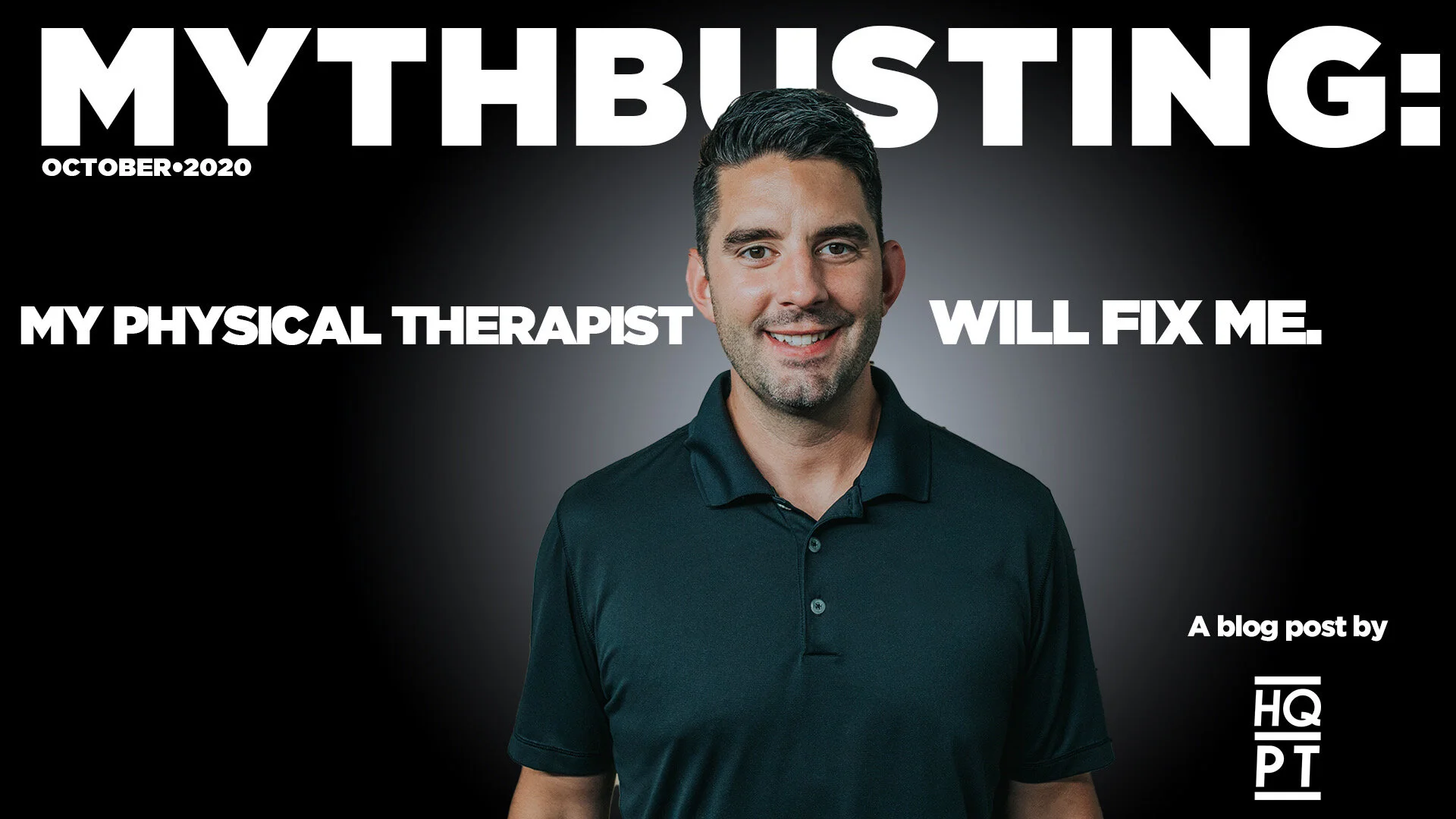Mythbusting: My Physical Therapist Will Fix Me
This week’s mythbusting blog comes from Dr. Ryan Baugus, PT, DPT.
The other day I saw a Facebook ad for a PT claiming that he had “unlocked the secrets of pain” and was offering a “pain free in 15 minutes” guarantee. I was so glad to hear that this provider had finally solved pain! What a gift - to have the secret sauce that can fix someone in one visit. Did you catch what I said there? A key phrase…”fix someone”. That phrase is loaded with background meaning that has a significant impact on the value and utility of a one-and-done, rack em’ and crack em’, quick fix treatment session. In truth, many conditions that we treat in the orthopedic setting have predictable healing times and a natural history in terms of tissue structure. Yes, there are ways we can speed up or enhance this process but this (almost) never happens over the course of a single session.
The myth that one PT session will solve your problems is a flawed premise for a few different reasons. I would like to highlight those reasons and offer some commentary on each.
1. The Magic Bullet concept
2. The thwarting of autonomy
3. Process oriented vs. results oriented mindset
The Magic Bullet
Even if we did have the magic bullet, would that TRULY be best for you as a person? I have thought about this many times over the course of my career and it seems to me that the magic bullet has potential to do more long term harm than good.
Pain and injury sucks. Plain and simple. However, I would also contend that those who endure hardships and persevere often look back on the difficulty as a transformative experience. Please note, this is not to downplay the suffering that takes place in the midst of injury. Individuals who overcome challenges build self-efficacy, the belief that they have the power to change their circumstances. They build resilience and learn first hand that their mind and body are more powerful than they thought. You have heard all of the catch phrases… “pressure makes diamonds”, “this too shall pass”, “tough times don’t last, but tough people do”. Okay, some of these are a little cliche, however, there is some truth. We learn on a very basic level through error correction and we grow through stress application and the overcoming of that stress.
Let’s pretend that you are a swimmer who has been dealing with a shoulder injury for a few months. You go to a physical therapist who works with you on the appropriate dosage of stress to the tissue and teaches you how to manage your workout volume and intensity in a more sustainable way. Likely, you aren’t swimming at the level that would be ideal for you in the first day or even the first week. However, you are improving on your own accord and have the ability to control your circumstances. You apply these principles and over time you feel better. You have also learned a great deal about yourself, your adaptability, and how to appropriately manage training (knowledge that will serve you well for years to come). Obviously, this won’t take place over the course of one session, however, the impact will be long-lasting. You’ll also walk away with the ability to apply the principles you learned to other situations you may encounter in the future!
Thwarting Autonomy
According to Self Determination Theory, our basic psychological needs are autonomy, competence, and relatedness. Autonomy is the idea that you are behaving with a sense of volition, endorsement, willingness, and choice. You aren’t bound to or reliant on anything externally for success. Unfortunately, in the profession of physical therapy it is incredibly easy for a provider to thwart the patient’s ability to achieve autonomy.
An internal locus of control is very important to maintain. This concept relates to the idea that your actions have a direct impact on your circumstances or situation. Now, taking the first step to see a physical therapist is a great way to express your autonomy and help develop that internal locus of control! That is your choice and, potentially, a good one to better yourself in the midst of pain or injury. What we must look out for is the thwarting of your autonomy. If the clinician takes ownership of the situation or promotes a reliance on their ability to “fix you”, they have thwarted your autonomy. For ways in which this can be done read one of our recent blogs about health misinformation.
Yes you may leave your first session feeling better but what happens the next time something comes up? What if your symptoms are back the next day or next hour? Are you bound to this treatment for life? Ideally, no. The hope is that you will have the education and tools necessary to invest in the process of building resilience and overcoming. It will most certainly take more than a one session but you will have essentially “fixed yourself” with a bit of coaching!
If you want to truly maintain your internal locus of control, a process oriented mindset will help you immensely. Trust the process and invest time and energy into it and you should see great rewards.
Process Oriented vs. Results Oriented Mindset
A process oriented mindset allows you to invest in and appreciate the journey that leads to whatever result will come. It is so much easier to convince people to buy into a quick fix, “15 minute pain free guarantee”, than it is to tell someone the truth. But we aren’t about easy, we are about right. The result is valuable, don’t get me wrong. Getting out of pain and back to doing what you want to do is absolutely the goal. I would propose that there is just as much value in how you get there and the steps you take to achieve the result. I will reiterate, this is not easy work. It requires investment on a personal level, believing in yourself, listening, changing behaviors and mindsets, a growth mindset that invites cognitive dissonance (the uncomfortable feeling you get when new information conflicts with preconceived beliefs).
Good physical therapy is hard work, mentally and physically. It takes commitment to the mindset and fostering the ability to believe in yourself. If you have a PT in your corner who is fostering this within yourself and within the environment you are entering then congratulations - you found a good one! Once again, it is very unlikely that this can happen over the course of a single session. However, the relationship you develop with your PT over the course of however many sessions you participate in will be worth it. Disclaimer: This IS NOT meant to suggest that a person go to the other extreme and be in physical therapy sessions indefinitely. This is meant to suggest that you invest in the process that will work for YOU.
In conclusion, your physical therapy experience should be one that continually helps you develop confidence, autonomy, and resilience. If you are looking for the best physical therapists in Portland, OR to help guide you through this important process then look no further and reach out to us by clicking the contact button below!

